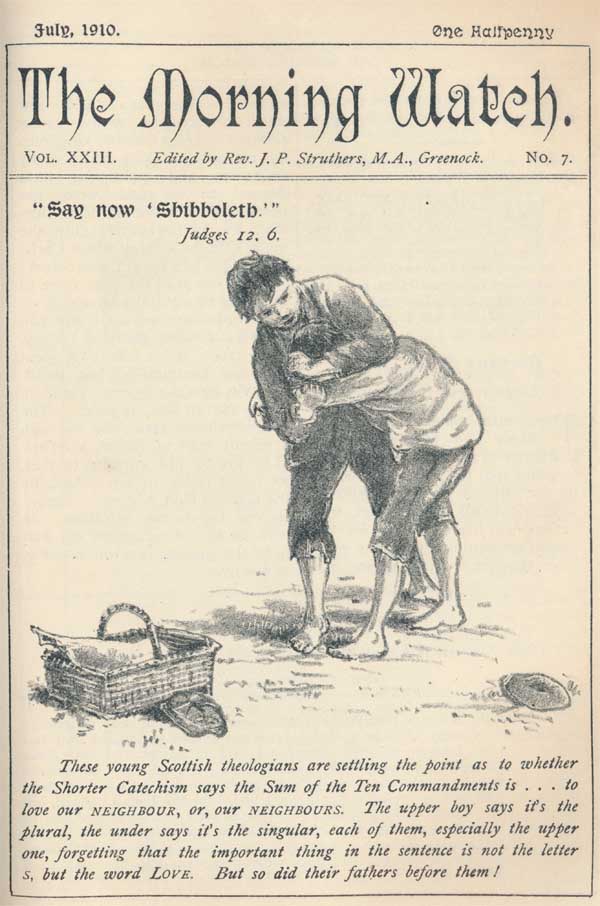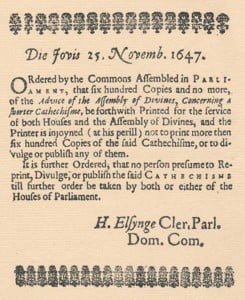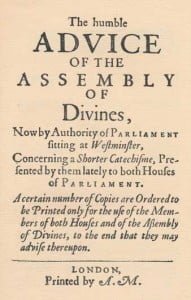Our time is short today, and we find sufficient reason to remind ourselves of a post well worth reviewing:
Birth of a Giant.
Benjamin Breckinridge Warfield was born on this day, November 5th, in 1851.
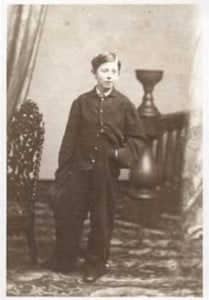 For God-fearing parents, every birth must bring some small trepidation, along with great hope and promise. We trust the Lord, we seek to live exemplary lives and strive to diligently do our part to raise our children, that they might never know a time when they did not trust in Christ Jesus for their salvation and rely upon Him completely. Child-rearing truly is a humbling thing, casting us upon the Lord, praying for His grace and mercy.
For God-fearing parents, every birth must bring some small trepidation, along with great hope and promise. We trust the Lord, we seek to live exemplary lives and strive to diligently do our part to raise our children, that they might never know a time when they did not trust in Christ Jesus for their salvation and rely upon Him completely. Child-rearing truly is a humbling thing, casting us upon the Lord, praying for His grace and mercy.
At the same time, some children, even from a young age, show great maturity and promise. You can see it in their face. Such a child, I think, was Benjamin Breckinridge Warfield.
All of the Warfield children were patiently led to memorize both the Shorter and Larger Catechisms, as well as the associated Scripture proof texts. Benjamin’s brother Ethelbert recounted that in their home “the shorter catechism was ordinarily completed in the sixth year, followed at once by the proofs from the Scriptures, and then by the larger catechism, with an appropriate amount of Scripture memorized in regular course each Sabbath afternoon.” In 1867, at the age of 16, he became a member of the Second Presbyterian church in Lexington, KY.
In 1868, he began the Sophomore year at Princeton College, graduating in 1871, with a strong interest in the sciences and a desire to pursue further studies in Scotland and Germany. But it was not until he returned home in 1872 that he announced his intention to explore a call to the ministry. That had long been his mother’s prayer for her sons, that they would become ministers of the Gospel. In 1873, he began his preparation for the ministry at the Princeton Theological Seminary.
Years later, Warfield wrote a brief article on the value of the Shorter Catechism. Warfield writes:
What is ‘the indelible mark of the Shorter Catechism’? We have the following bit of personal experience from a general officer of the United States army. He was in a great western city at a time of intense excitement and violent rioting. The streets were over-run daily by a dangerous crowd. One day he observed approaching him a man of singularly combined calmness and firmness of mien, whose very demeanor inspired confidence. So impressed was he with his bearing amid the surrounding uproar that when he had passed he turned to look back at him, only to find that the stranger had done the same. On observing his turning the stranger at once came back to him, and touching his chest with his forefinger, demanded without preface: ‘What is the chief end of man?’ On receiving the countersign, ‘Man’s chief end is to glorify God and to enjoy him forever’ — ‘Ah!’ said he, ‘I knew you were a Shorter Catechism boy by your looks!’ ‘Why, that was just what I was thinking of you,’ was the rejoinder.
It is worth while to be a Shorter Catechism boy. They grow to be men. And better than that, they are exceedingly apt to grow to be men of God. So apt, that we cannot afford to have them miss the chance of it. ‘Train up a child in the way he should go, and even when he is old he will not depart from it.’
[B.B. Warfield, “Is the Shorter Catechism Worth While?” in The Selected Shorter Writings of Benjamin B. Warfield, Vol. 1 (Nutley, NJ: Presbyterian and Reformed), 1970), pp. 381ff.]
[Note: It is tempting to think that Warfield may have come by this anecdote through his own extended family. There were a number of men in the Breckinridge family who were military officers. Of these, Ethelbert Ludlow Dudley Breckinridge, an 1898 graduate of Princeton University and a lieutenant in the U.S. Army in 1906, seems the most likely candidate to fit the details of the story. Moreover, the San Francisco earthquake would appear to be the most probable setting of the story.]
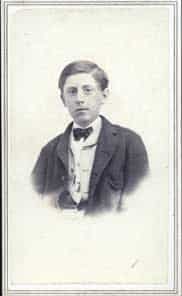 Words to live by: God bless faithful parents! May He equip, encourage, sustain, and support those loving parents who know that they must daily rely completely upon the Lord in the raising of their children. Child-rearing is entirely a matter of trusting prayerfully in the grace of God. Patiently love them, spend sacrificial time with them, live exemplary lives in front of them. But above all, pray daily for them, that God by His grace would save them to the uttermost. You never know when a child will grow up to be greatly used in the advance of the Lord’s kingdom.
Words to live by: God bless faithful parents! May He equip, encourage, sustain, and support those loving parents who know that they must daily rely completely upon the Lord in the raising of their children. Child-rearing is entirely a matter of trusting prayerfully in the grace of God. Patiently love them, spend sacrificial time with them, live exemplary lives in front of them. But above all, pray daily for them, that God by His grace would save them to the uttermost. You never know when a child will grow up to be greatly used in the advance of the Lord’s kingdom.
Image sources : Original photographs preserved at the PCA Historical Center. Scans prepared by the Center’s staff. Photo 1, Benjamin B. Warfield, 1864, age 13. Photo 2, B.B. Warfield, 1867, age 16.

![Rev. Dr. Daniel Baker [17 August 1791 - 10 December 1857]](https://thisday.pcahistory.org/wp-content/uploads/2012/08/bakerDaniel-150x150.jpg)
